COMMONS MAGAZINE
What if we put the future first?
What if we prioritized the well being of everyone’s kids and grandkids ahead of today’s myopic economic and political interests? What if we honored everyone’s right to sustainably use the commons?
These are questions at the heart of the groundbreaking Future First 2014 Women’s Congress held November 7-9 in Minneapolis: to call on the untapped power of women to halt the degradation of our planet.
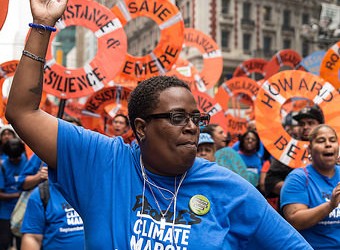
Annette Bernhardt under a CC license
A 90-year old water main ruptured in Los Angeles this summer, wasting ten million gallons of water in the midst of a record drought.
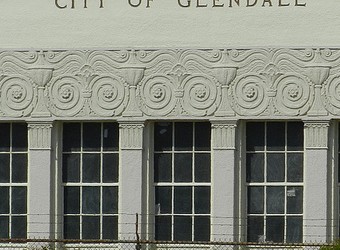
Glendale, California is one of 2000 US cities with municipal power utilities. (Photo by Scott Lowe under a CC license.)
Public radio’s David Brancaccio is a solid reporter. Perhaps the cognitive dissonance of talking about public ownership on a business program called Marketplace caused him to go astray. Nevertheless a few days ago he did his listeners a disservice when commenting on the city of Somerset, Kentucky’s new venture: Selling gasoline directly to city residents.
Somerset’s entrepreneurialism prompted him to explore other municipal enterprises, “I looked around for some precedents and they are interesting.”

Minnesota Governor Floyd Olson was elected on a platform advocating that resources be "operated democratically for the benefit of all the people".
I recently attended Common Bound, a Boston conference sponsored by the New Economy Coalition, a network of organizations committed to a more just and sustainable economy. The gathering included progressive luminaries and a wide range of thoughtful presentations. It was thankfully diverse, in gender, racial background and age. Indeed, most of the staff of the New Economy Coalition is under thirty, a sign that Millennials have gone beyond Occupy in seeking practical alternatives to our present failed economic order. But what seemed missing at

(By Ijirawu Jimbo under a CC license)
Human decisions and human activities are imposing enormous costs on the life-support systems of planet Earth. Left unchecked, the results will be catastrophic for all living things, including humans. Some of the damage to life and the systems that support life is irreversible. Fortunately, the message is out there to “save the environment.”
Animalia Terrestria
I set my feet
in the slow-moving, foliate river
and sometimes they are rich with brown oily fur
and sometimes their lime webs are sails that let in the dim sun
and sometimes they shine pebbled like black leather,
algae tangling my claws in curtained clouds
and sometimes
my terrible strong-tailed body drags behind

Neighborhood post offices would be replaced by a counter in a big box store with a barely trained clerk. (Photo by Bruce Tuten under a Creative Commons license.)
The United States Postal Service (USPS) management just ran into a possible game-changing obstacle to its shameful pursuit of a fully privatized post office: labor solidarity.
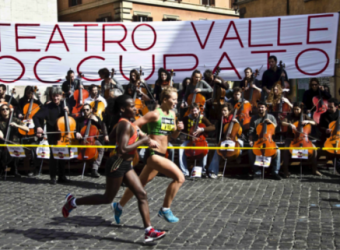
Occupiers of Rome's Teatro Valle want to move Italy's cultural policies in the direction of the commons.
The three-year occupation of Teatro Valle in Rome is now legendary: a spontaneous response to the failures of conventional government in supporting a venerated public theater, and the conversion of the theater into a commons by countless ordinary citizens. Now the mayor of Rome is threatening to end the occupation, evict the commoners, and privatize the management of the facility.
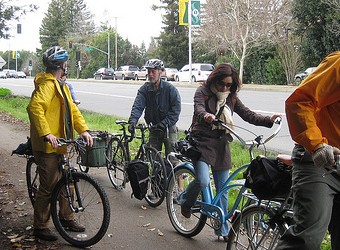
Davis, California, leads the nation in biking with its network of bike lanes, off-road bike trails and an increasing number of protected bike lanes. Twenty-two percent of all trips around town are by bike. (Photo by Thanh Ha Dang under a Creative Commons license.)
America lags behind most of the rest of the world when it comes to biking. Even Canadians were found to bike three times more than Americans in a 2006 study.
The dominance of the automobile in American life--especially the influence of auto interests in American business and politics--is no doubt the overwhelming reason. But a surprising contributing factor has been the resistance to special facilities to make biking safer by a small but dedicated band of bicyclists themselves.
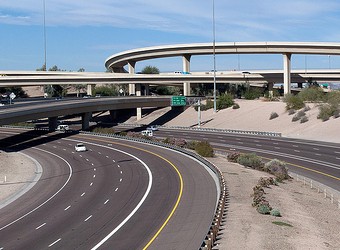
Gas taxes don't cover the cost of building and repairing highways, not to mention the environmental pricetag. (Photo from flickr.com under a Creative Commons license.)
It’s almost certain that Congressional Republicans will soon vote overwhelmingly to violate one of their most cherished guiding principles: A service should be paid for by those who use the service. If we don’t fully pay for services, Republicans usually insist, markets can’t work effectively. This undervalues and overuses public services, resulting in wasteful overspending.
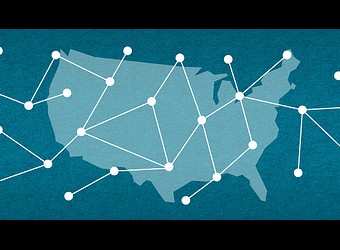
Image from Free Press Pics under a Creative Commons license.
“(W)ithout power and independence, a town may contain good subjects, but it can have no active citizens.” That was the conclusion of Alexis de Tocqueville after touring a youthful American Republic in the early 1830s, as recorded in his classic Democracy in America. Today we are engaged in a renewed debate about the authority of governments closest to the people.

The Midtown Greenway in Minneapolis, a rail-trail that links to hundreds of miles of other trails and parkways throughout the region. (Photo by Micah Taylor under a Creative Commons license.)
Americans are people on the go!
It’s been that way since the early days of the Republic when white pioneers pushed past the Appalachians to settle the West (with unfortunate results for the native peoples already living there). The urge to move is part of our national character and greatly influences how we spend our leisure time.

Conservatives, progressives and everyone else likes farmers' markets, local food, mom-and-pop stores and other qualities of a thriving community. Can they all connect around the commons? (Photo of the Barberton, Ohio, Downtown Farmers Market by the Barberton Community Foundation under a Creative Commons license.)
In the early-to-mid-20th Century the Distributists—led by English authors G.K. Chesterton and Hillaire Belloc—took a dim view of both socialism and corporate capitalism. As conservatives they did, however, believe in private property--so much they thought it should be “distributed” as widely as possible among the whole population.
.png%EF%B9%96itok=t3HzdEZS.jpeg)
Judges appraise the quality of tap water from various US communities at the 133rd annual conference of the American Water Works Association.
The verdict is in: Don’t spend another penny on bottled water in Boston. That city, derided in the 1960s rock song “Dirty Water”, came out on top of the 2014, “Best of the Best” Tap Water Taste Test.
I was director of the FLOK research team, [which in late June finished up its work sponsored by the government of Ecuador to “fundamentally re-imagine” the country based on the principles of the commons]. Many people have asked about my assessment of the results of the process. The FLOK process was a complex process and the assessment can only be complex as well.
One of the first questions, and critiques, is about the relationship with the government itself.
Charity Mahouna Hicks
Charity Hicks was an extraordinary Detroit activist, advocate, and movement weaver. A native Detroiter raised on the lower east side right off of the Detroit River which contributed to her love for the environment.
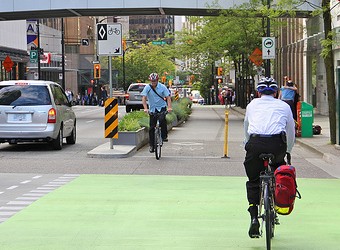
A protected bike lane on Dunsmuir Street in Vancouver separates riders from busy traffic. (Photo by Paul Krueger under a Creative Commons license.)
You can see big changes happening across North America as communities from Fairbanks to St. Petersburg transform their streets into appealing places for people, not just cars and trucks.
“Over the past five years we’re seeing an infrastructure revolution, a rethinking of our streets to accommodate more users--busways, public plazas, space for pedestrians and, of course, bike lanes,” says David Vega-Barachowitz of the National Association of City Transportation Officials. “More protected bike lanes is one of the most important parts of this.”

Healthy living conditions and community cohesion boost everyone's health. (Photo by Project for Public Spaces)
There is growing recognition in the medical field that maintaining good health means more than taking care of yourself and getting regular medical check ups. Healthy living conditions and strong community cohesion foster healthy neighborhoods, while inequality, discrimination, crime, pollution, traffic, isolation, and a sense of powerlessness contribute to disease. It’s difficult to improve people’s overall health without addressing the social, economic and racial issues where they live.
Indeed, you can think of health as a commons in which we all have a stake in maintaining.

"The Reconciliation of Oberon and Titania", a painting depicting a scene from Shakespeare's A Midsummer Night's Dream by Sir Joseph Noel Paton.
Those in the premodern world who hoarded possessions and refused to redistribute supplies and food, who turned their backs on the weak and the sick, who lived exclusively for hedonism and their own power, were despised. Those in modern society who are shunned as odd, neurotic or eccentric, who are disconnected from the prosaic world of objective phenomena and fact, would have been valued in premodern cultures for their ability to see what others could not see. Dreams and visions---considered ways to connect with the wisdom of ancestors---were integral to existence in distant times.
Imagine the Great Lakes as shared waters cared for and protected by the entire region’s community. That’s the vision of the Great Lakes Commons, which has recently launched its new website.